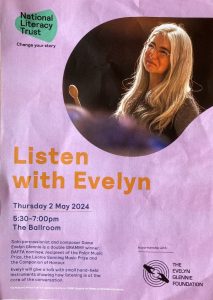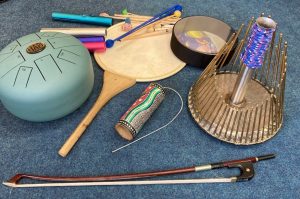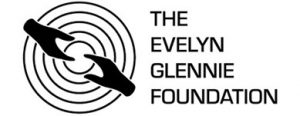Evelyn and I left Huntingdon, Cambridgeshire to the soft whispering of waves breaking on a sandy beach. Bit disconcerting as the nearest stretch of sea is at least 50 miles away. The sound, in fact, was coming from the ocean drum which was nestled between the paddle drum and the waterphone on the back seat of the car. Each time we turned a corner the pellets inside slid across the skin of the drum giving the instrument an excellent opportunity to live up to its name.
 Our destination was HMP Askham Grange, an open prison for female offenders in the UK where Evelyn was due to run a workshop for those of the women who wished to attend. It was an event which had been arranged by the National Literacy Trust.
Our destination was HMP Askham Grange, an open prison for female offenders in the UK where Evelyn was due to run a workshop for those of the women who wished to attend. It was an event which had been arranged by the National Literacy Trust.
Becca, our main contact, explained that when she first worked with these women about seven months ago, none of them felt they had a story worth telling, such was their low self-esteem but now some of them are beginning to see that they might have something to say.
Evelyn started by playing Pezzo da Concerto No1, Op 15 by Nebojša Jovan Živković- a snare drum piece that starts quite softly with the rim and the skin of the drum being played with ever increasing rapidity, complexity, and volume. I looked around the room at the hard body language and stoney faces – tough crowd. Part way through the piece, one of the sticks is played with some force flat on the drum making a sound like a pistol shot – still not a flicker from this tough audience but by the end there was a ripple of applause.
 Also displayed on the floor around Evelyn was an inviting variety of percussion instruments including vibratones (which look like brightly coloured relay batons), a thunder sheet hanging from a frame, a stack of sticks and mallets (some homemade), a tongue drum, a spring drum, the waterphone, a large paddle drum, Japanese cup bells and of course the infamous ocean drum mentioned previously.
Also displayed on the floor around Evelyn was an inviting variety of percussion instruments including vibratones (which look like brightly coloured relay batons), a thunder sheet hanging from a frame, a stack of sticks and mallets (some homemade), a tongue drum, a spring drum, the waterphone, a large paddle drum, Japanese cup bells and of course the infamous ocean drum mentioned previously.
With a gentle question and answer style, Evelyn explored how the whole body can be used as a resonating chamber, how different parts of the body can feel different sounds and how the sound palette also includes the people in the room, the room itself and the sounds outside the room. Starting with one or two of the braver souls, remarkably quickly Evelyn managed to entice nearly all the group to join in with answers, to try out the instruments to see what sounds they could produce and eventually finishing the session with a smooth contemplative improvisation using the instruments we had provided. It was very moving.
Whilst this was definitely not a music lesson, it was most certainly a fabulous life lesson with the potential to be life changing. Feedback from the participants included saying that the session made them want to engage with other educational opportunities and that it made them think their story was worth telling.
Becca, our contact from the National Literacy Trust, said:
“In our team we have been messaging each other today and the same theme is coming up; we feel so inspired, calm and even “floating”! I certainly have a very strong image of them sitting proudly, holding those instruments with smiles I had never seen before, the stress seemed to just leave their faces and bodies.”
As a founding trustee of The Evelyn Glennie Foundation, I was already aware of the power of listening, but not even I could have dreamt how transformational it could be in such a challenging setting. One small step towards our goal to:
Teach the World to Listen
Caroline Thompson
Founding Trustee, The Evelyn Glennie Foundation


